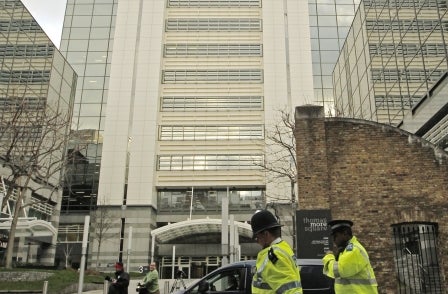
A police officer has won £60,000 damages over a claim that there were strong grounds to believe he was dishonest and corrupt.
Gary Flood was a detective sergeant with the Metropolitan Police's Extradition Unit in June 2006 when the article at the centre of his High Court libel action appeared in The Times and then on the Times Online website.
Headed "Detective accused of taking bribes from Russian exiles" it read: "Police are investigating the alleged sale to a security company of intelligence on the Kremlin's attempts to extradite opponents of President Putin."
After an inquiry, neither criminal nor disciplinary charges were brought against Mr Flood, who returned to the unit when he was exonerated and, in September 2007, The Times was informed of the outcome of the investigation.
During lengthy legal proceedings, launched in May 2007, the Supreme Court said that publications up to September 5 2007 were protected by a defence of public interest privilege but Times Newspapers Ltd subsequently withdrew its appeal relating to website publication after that date.
Later, the newspaper abandoned its defence of justification, leaving Mrs Justice Nicola Davies to assess damages in respect of the publication on the website from September 5 2007 until October 21 2009.
In London today, she awarded Mr Flood £45,000 to reflect his distress and anxiety, the damage to his reputation and the need for proper vindication.
She added another £15,000 to reflect the newspaper's conduct and "to serve as a deterrent to those who embark upon public interest journalism but thereafter refuse to publish material which in whole, or in part, exculpates the subject of the investigation".
She said: "It is possible to pursue journalism said to be in the public interest and demonstrate consideration for the subject whose reputation may suffer in the event of publication.
"The need for such consideration is particularly acute given the subject's lack of redress.
"Once it is known that there is material which exonerates, in whole or in part the subject of the journalistic investigation, consideration should be shown for the position of the subject by publishing exculpatory material."
She said that, on the facts of the case, no such consideration was demonstrated by Times Newspapers Ltd towards Mr Flood during the relevant dates.
"The absence of consideration is compounded by the fact that the article published in June 2006 contained allegations which attacked the core of the claimant's character, personally and professionally," she added.
"Of this experienced and responsible police officer, a recognised expert in his specialised field, it was being alleged that there were strong grounds to believe that he was dishonest, corrupt and acting in a manner which represented not only serious criminal conduct but a grave breach of the trust which had been placed in him.
"In my view, following the conclusion of the police investigation, the claimant was entitled to expect the defendant to amend the article and to publish, at the very least, the outcome of the investigation.
"The fact that for two further years the claimant had to live with the article, publicly detailing allegations of dishonesty and corruption, of itself, represents a need for proper vindication."
Email pged@pressgazette.co.uk to point out mistakes, provide story tips or send in a letter for publication on our "Letters Page" blog

